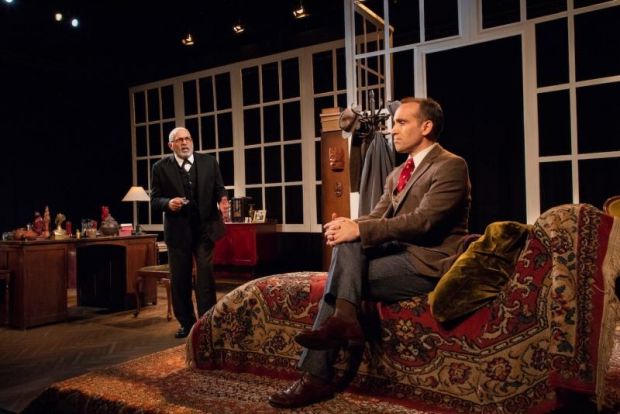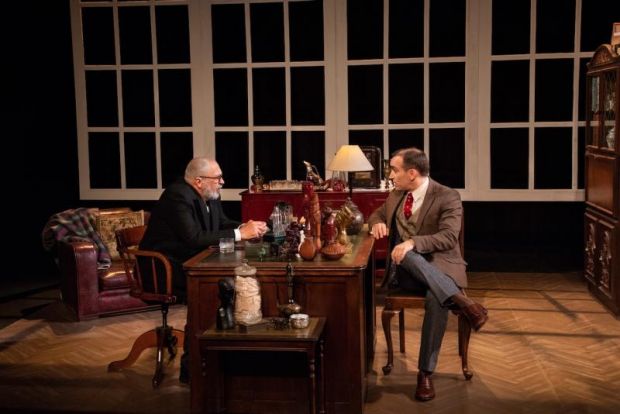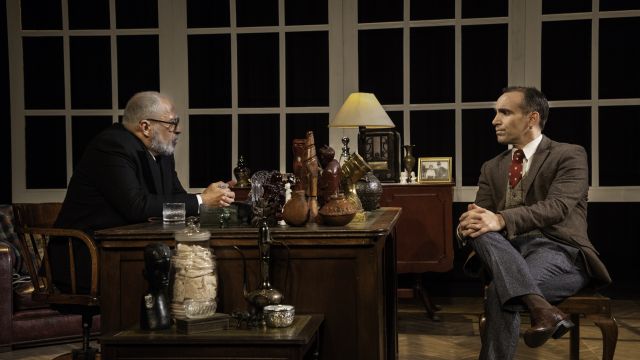Freud’s Last Session
Mark St. Germain is a prolific American writer of plays, musicals, and documentary films. All of them are much acclaimed, many of them involve famous people. His play Becoming Dr Ruth tells the story Dr Ruth Westheimer, who escaped from Nazi Germany in the Kinderstransport, went on to Israel and America, and eventually became a pioneering radio and television sex therapist.
St. Germain’s film My Dog involves actors such as Richard Gere and Glenn Close talking about their love of dogs. His musical Stand by Your Man is the story of Tammy Wynette. In the play Scott and Hem, he imagines a conversation about “the cost of love, friendship, and the price of being a writer” between F. Scott Fitzgerald and Ernest Hemingway.
In Freud’s Last Session, St. Germain moves his research to England where he imagines a meeting between the aging Viennese psychoanalyst Dr Sigmund Freud (Nicholas Papademetriou) and Professor C.S Lewis (Yannick Lawry), Oxford don and creator of the Narnia fantasies. This is a reprise of Clock and Spiel’s 2018 production, directed with sage sensitivity by Hailey McQueen, and is a welcome addition to Riverside’s busy 2022 season.
The scene is London on the morning of Sunday 3 September 1939. Prime Minister Neville Chamberlain will shortly declare war on Germany. The setting is Freud’s study, a replica of the study he left behind in Vienna when he fled the Nazis.
Designers Tyler Ray Hawkins and Kaitlin Symons have reproduced the study in great detail, including the famous couch and the collection of religious antiquities on his desk. Lighting designer Emma Lockhart-Wilson suggests subdued autumn light filtering through high windows and adds the warmth of two table lamps.

Freud paces slowly. He is a stickler for punctuality. Lewis is late. Freud is an atheist. Lewis is a born-again Christian. The air is not electric – but it fizzes! Freud’s dog announces Lewis’ arrival with a few barks … and Freud walks slowly to open the door.
What ensues is a learned, rational debate about the existence of God – a debate that is never stuffy, as one might expect, or lacking in humour. St. Germain does his research well, and the characters he creates are enriched with the language and ‘style’ of both ‘characters’. Rational debate is sprinkled with scholarly repartee and humour. Both men are subtly defined in the writing – and the actors who play them use the dialogue to explore the many dimensions of these colourful 20th century figures.
Freud, at 83, is in great pain following treatment for oral cancer which required his upper palate to be replaced with a plate. He will die before the month’s end. Nicholas Papademetriou inhabits his age, his intelligence … and his suffering … with convincing belief.
Slightly hunched, holding a handkerchief ready to cover each pain-ridden cough, he shows the physical frailty of Freud’s age and illness, but there is none of that frailty in his intellect, his arguments or his humour. He listens carefully, considers every response, delivers it clearly, concisely – and watches for Lewis’ reaction. Papademetriou never loses the rhythm of Freud’s accent, built into the phrasing of his lines.

Lewis is 59, enthusiastic, influenced by his Oxford literary group the Inklings, and his strong belief in God. He is also a little nervous, believing Freud has ‘summonsed’ him because of his criticisms of Freud’s paper on Paradise Lost. Yannick Lawry manages to build all of that into his performance, including his respect for the older man and his concern for his health. He is deferent but is strong in his defence of his faith.
Under McQueen’s direction, they move around the stage judiciously, taking each segment of the argument to different parts of the room, at first on two elegant chairs near the door, later at each side of the desk. Each sits on the couch, though fleetingly. Thus the set itself becomes integral to the tone and tenor of the debate.
There is nothing to be faulted in this production. And it comes at a time when many of the references to Hitler, dictatorship, the Nazi invasions and the effects of war mean a little more to this contemporary audience than St. Germain intended in 2010.
Carol Wimmer
Subscribe to our E-Newsletter, buy our latest print edition or find a Performing Arts book at Book Nook.

